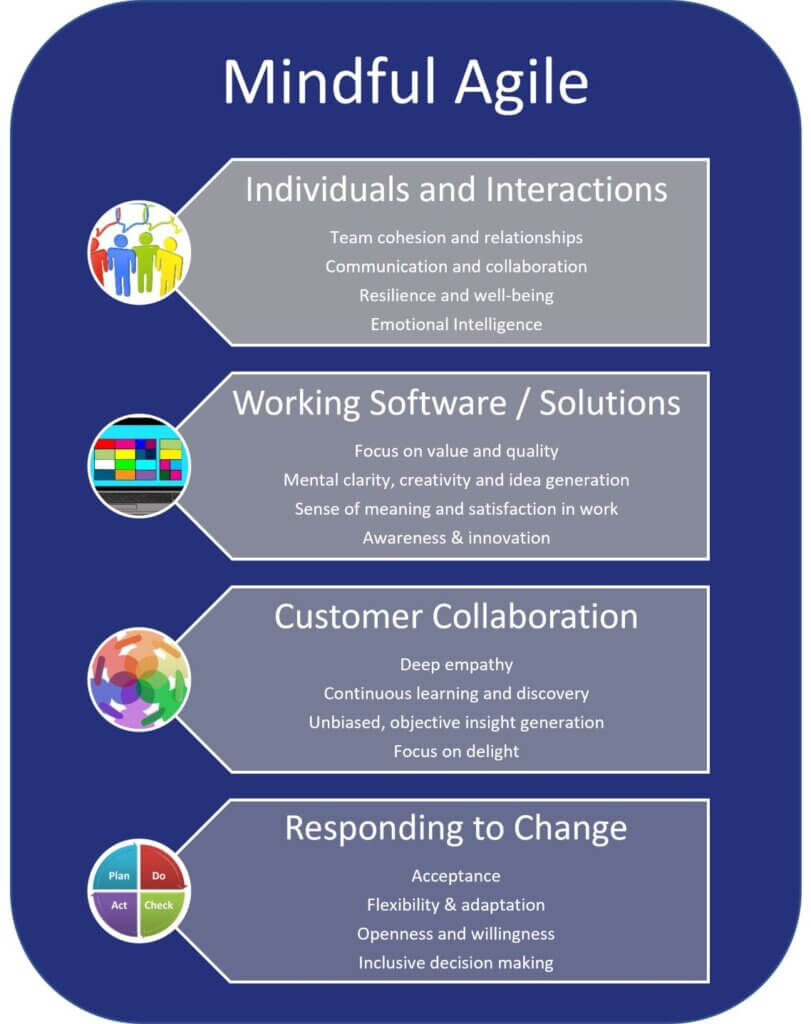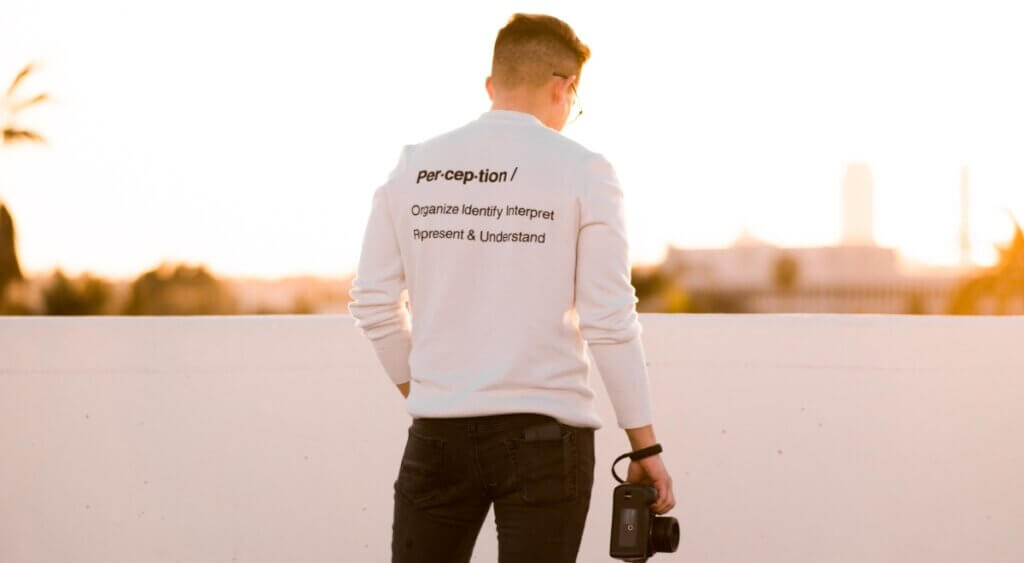5 . Mindfully Agile
Become Conscious of How You Are Thinking and Acting

By Kathy Berkidge
“Agile is a mindset”. Yes, yes. We have all heard this before. So, what exactly do we mean by mindset?
According to Wikipedia, “…a mindset is a set of assumptions, methods, or notations held by one or more people or groups of people that is so established that it creates a powerful incentive within these people or groups to continue to adopt or accept prior behaviours, choices, or tools.”
Other definitions further elaborate:
- “A fixed mental attitude or disposition that predetermines a person’s responses to and interpretations of situations” (The Free Dictionary).
- “The established set of attitudes held by someone” (Oxford Dictionary).
- “A mental inclination, tendency, or habit” (Merriam-Webster.com – Medical Dictionary).
Simply put, it is a way of thinking about events and phenomena in such a way that it becomes a modus operandi. It is our mindset that influences how we think and behave in any given situation.
So, what is an Agile mindset?
An Agile mindset is a set of attitudes and beliefs that support the effective adoption of Agile frameworks and practices in a team or organisation.
Characteristics of an Agile mindset include collaboration, transparency, flexibility, openness, trust, growth, continuous learning, adaptation, empowerment, outcome focus, value maximisation, waste minimisation and safety to fail.
It is the Agile mindset that allows teams to be high performing and deliver value while responding to constant and rapid change.
It enables individuals, teams, and organisations to truly adopt the Agile values and principles, not simply go through the motions and just do the Agile practices and ceremonies.
How does mindfulness fit in?
While there are many definitions of mindfulness, it is simply the quality or state of being fully conscious or aware. If we are trying to be truly Agile, we must embody the Agile mindset.
Mindfulness brings awareness into our mindset. It allows us to check in with ourselves and examine our attitude. We become conscious of how we are thinking and acting to see whether we are exhibiting the Agile mindset and adjust our attitude and behaviour if required. Through this awareness, we maintain the Agile mindset.
Mindfulness enables us to be aware to what is happening with our work, in our team, about our customers’ needs and what is (or is not) valuable.
It enables us to respond to each other with more consideration and work together with greater cooperation, which is essential for Agile team success.
Other benefits of mindfulness include increased focus, clearer thinking, stress reduction, better decision making, along with increased happiness and feeling of well-being.
Mindfulness is also associated with increased creativity and innovation. When our minds are bombarded with hundreds of thoughts, stresses and emotions, our brains simply cannot be creative effectively.
Through mindfulness, our minds become more settled, clear and calm. Thoughts subside, allowing us to open our minds and to think about problems and solutions in new and innovative ways.
Mindful Agile and the Agile Values
When we review the core values from the Agile Manifesto, mindfulness can help us ensure each value is enacted effectively in line with the Agile mindset.

1. Individuals and Interactions
This value from the Agile Manifesto highlights the importance of collaborative teamwork. Teams are comprised of individuals, with each person responsible for their contribution towards achieving the team’s goals.
Mindfulness enables each team member to remain aware of how their attitude and behaviour contributes to the team culture, as well as how it may impact their interpersonal relationships with the other team members.
It helps maintain a mindset of trust, openness, and transparency that allows teams to work together with greater cooperation and focus, overcome difficulties, share ideas, and challenge each other without falling into chaos and conflict.
Mindfulness enables us to be present when communicating with others. When working with our team during stand-ups, retrospectives and other team activities, we can remain aware of where our attention is placed.
If we detect that our mind is wandering or if we’ve been distracted, we can redirect our attention back to where it needs so we can listen, stay focussed, and actively participate and collaborate effectively with the team.
The benefits of mindfulness includes reduced stress and increased resilience. By practicing mindfulness, we can detect if our minds are racing, ruminating, replaying events of the past or projecting scenarios in the future, all of which can increase anxiety and promote negativity.
Mindfulness does not prevent stressful events or remove setbacks. However, it allows us to take more productive paths of thought and action when faced with difficulties or failure, to be more accepting and move forward with optimism and a positive outlook.
By being more aware of our inner world, our thoughts, feelings and emotions, mindfulness helps build our emotional intelligence.
Wikipedia defines emotional intelligence as, “… the ability to perceive, use, understand, manage, and handle emotions…recognize their own emotions and those of others, use emotional information to guide thinking and behaviour…”
Mindfulness enables us to recognise our inner state of mind, shine awareness into how our emotions may be affecting our behaviour, and then apply self-regulation to prevent us acting in a way that compromises the team’s performance or contradicts the Agile mindset.
2. Working Software / Solutions
Agile teams focus on delivering value, which is, of course, on delivering software or other business solutions. Mindfulness helps maintain focus by bringing awareness into what we are, or are not paying attention to, detect distractions, and direct our attention to where it needs to be.
That way, we keep what is valuable “front of mind,” along with the level of quality required, to ensure our work and actions align to the value expected by our customers and users, and not create waste and rework.
Knowing that we are creating value gives us purpose in our work, a sense of meaning and satisfaction that contributes to motivated and productive teams.
When we think of creativity, we think of transcending current ideas and methods to create new or unusual ways of solving problems. But our perceptions, beliefs, expectations, judgements and negativity can prevent us exploring new ideas.
We may dismiss an idea before we let it fully blossom then fail to investigate further possibilities. We need to open our mind and make space for the new, the untried, the unconventional.

Mindfulness gives us the power to notice if we are falling into the trap of preconceptions, to put them aside, clear our mind and let our imaginations run free.
3. Customer Collaboration
Collaboration is not just about people working together. It is about working together for a shared and common goal. And that shared and common goal is to satisfy the customer!
We must understand our customers and see things from their point of view to create solutions that not only satisfy their needs but bring them delight. Empathy is needed to ensure we do not just implement requirements that we think they need but deliver what they actually need.
Mindfulness allows us to drop our own beliefs and perceptions to open our eyes to how the customer considers the problem and any potential solution.
We can detect if we are seeing things from our own point of view and redirect our awareness to stay open to learning and discovering what is truly helpful from our customers’ perspective.
This allows us to gain real insight into what is valuable to them and generate ideas and solutions from an open, objective and unbiased position.
4. Responding to Change
Change is the new normal. The current crisis is a great reminder that change can happen on a micro or macro scale. We all know change happens –we just do not know when, where, how, who or what will change. But change can be stressful. It can make us anxious, disappointed and undermine our state of well-being.
Resisting and ruminating does not help. We often do not even realize that these unconscious thoughts are happening, which can hold us back.
Mindfulness can help us maintain a mindset that truly welcomes change. Mindfulness enables us to accept what is happening, respond consciously, adapt and move on.
By remaining aware of our thoughts and feelings, we can identify if we are being fixated, rigid, or stuck, holding onto the way things were or how we hoped they would be. Then, if that is the case, we can reframe, be flexible and adapt our plans and solutions to whatever happens as it happens. Certainly, this requires an openness and willingness to let go, which the Agile mindset enables us to do.
TAKEAWAY
Mindful Agile is the perfect combination of the Agile mindset and mindfulness. Mindful Agile allows individuals and teams to build an Agile culture that truly embodies the Agile values and principles and ‘be’ Agile –not just ‘do’ Agile.
I am Kathy Berkidge and these are my agile-thoughts
2021 © Melbourne, AUSTRALIA by Kathy Berkidge

With a background in software development, Kathy is an Agile professional with over 30 years of experience in delivering software solutions and process improvements in multiple roles including business analyst, product owner, project manager and Scrum Master.
Since 1999, Kathy has been studying, practicing and teaching mindfulness. Working with teams and individuals, Kathy helps people understand the Agile mindset and integrate mindfulness practices into their Agile delivery methods to improve teamwork, be more innovative and deliver better customer value.
She is passionate about seeing people, teams and organisations succeed and thrive in an environment of collaboration and harmony.
DID YOU LIKE IT?
